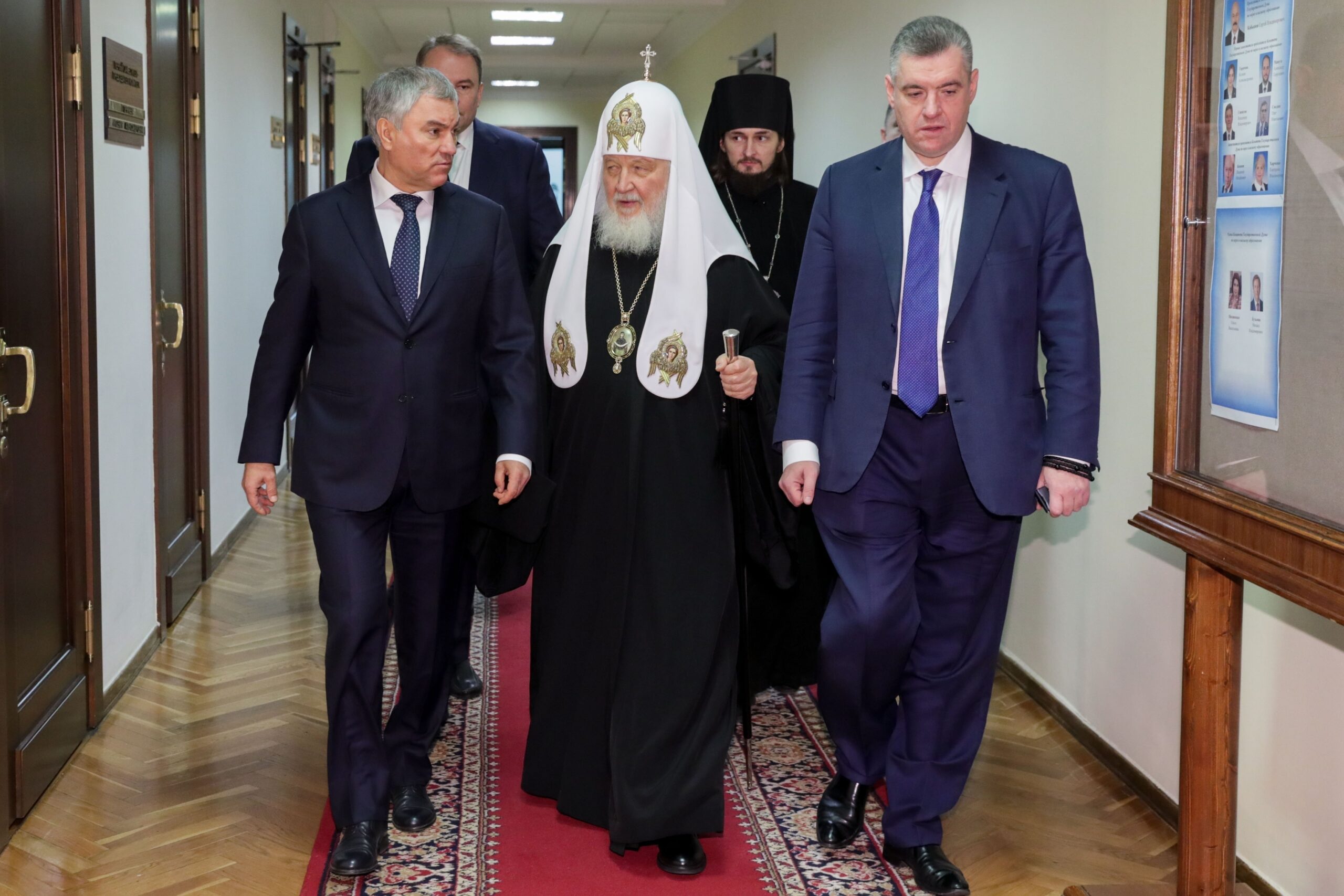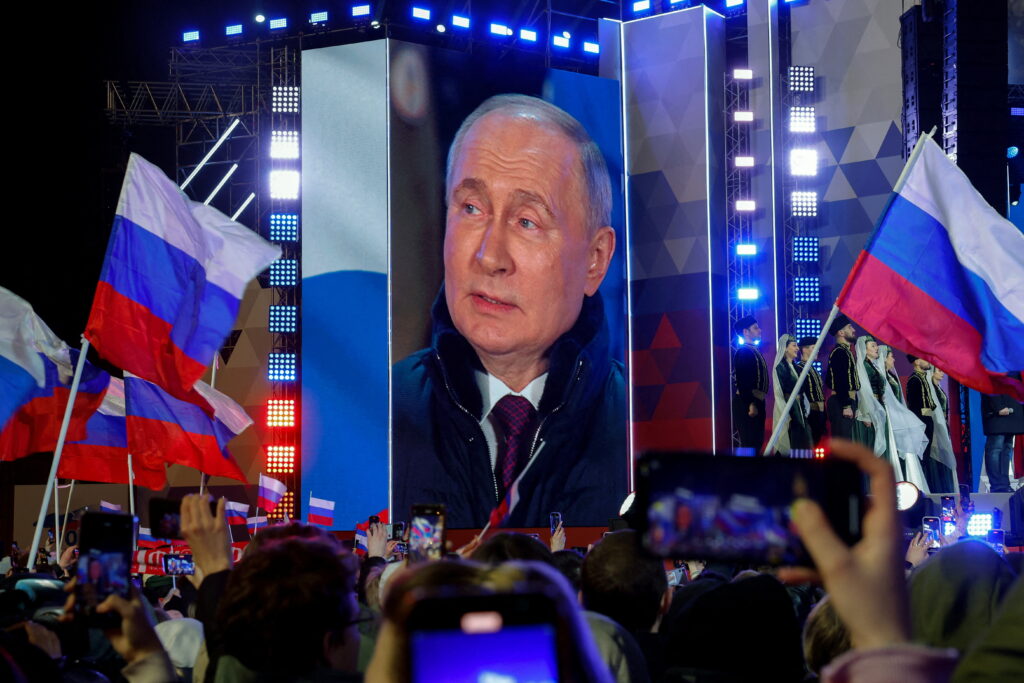As part of the Kremlin’s efforts to eliminate dissent and homogenize Russian society around «traditional values», the Russian regime has been seeking to curtail women’s bodily autonomy. New attempts to restrict abortion and birth control in Russia have been designed not only to police the female body, but also to weaken women’s potential power as a social and political force capable of reckoning with Putin’s authoritarian rule.
A narrative of population decline
Many officials are rationalising these expanded legal and social controls over women’s bodily autonomy under a narrative centered on countering demographic birth rate decline — asserting motherhood as a qualifying factor of «traditional» Russian femininity. At a recent forum on «Demography and Family Policy 2023: Relying on Traditional Values», the Minister of Justice described the country’s duty to protect traditional values which counter the feminist «ideology of childlessness». In September, a community of doctors, scientists, public figures, and government representatives in support of an abortion ban gathered at the «Abortion and Women’s Health» conference in Moscow, where members called for widespread restrictions to curb the «social disease» of abortion.
These pro-regime pseudo-scientific propaganda narratives buttress the heavy-handed new legal and health controls over women’s bodies. In May 2023, the Ministry of Health introduced new speech modules for obstetricians and gynecologists to use when discussing abortion with a patient in order to increase the country’s birth rate. The modules include phrases such as «Being a young mother is great!», to be used in situation with underage patients.
Meanwhile, the Ministry of Health has already added two abortion drugs, misoprostol and mifepristone, to a list of controlled substances to restrict their circulation. The Ministry has also developed a draft order to place legal limits on access to medical abortion, expected to be implemented by the end of 2023 despite record-high demands for abortion pills in the country last year. Elsewhere, the regional government of Mordovia has adopted a law which prohibits inducing women to have an abortion — fining guilty citizens up to 10,000 rubles ($ 100) and clinics up to 20,000 rubles ($ 200).
Public institutions and media platforms actively applaud these initiatives — and some lobby for the government to go even further. The Russian Orthodox Church, a resurgent institutional force in the country, drives its followers to a traditionalist morality, bolstering support for regime lines on social issues like abortion. Church officials deride the country’s high abortion rate as emblematic of a greater moral crisis. Orthodox leaders vociferously call for curbs on abortion, spread propaganda against the practice, and continue to suggest laws to restrict women’s access to contraception.
Z-Girlfriends and feminist ‘extremists’
State-aligned media channels equate motherhood and wifehood to the male duty of military service within rampant nationalistic discourse in support of the war. In a new YouTube propaganda show «Z-Girlfriends», three pro-war female influencers mobilize gender demonstrations, urging women to provide men «young, beautiful women for whom soldiers will fight». A scan of popular social media platforms reveals a stream of similarly narrow concepts of a woman’s social role, attacking things like abortion and alimony as direct threats to the Russian nation’s well-being. In April, the Russian State Duma proposed labeling feminists as extremists — equating women’s freedoms, including the rights to divorce, abortion, and birth control, with anti-Putin forces of social destruction.
These narratives and new laws do not come from nowhere. They follow on from years of oppressive legislative activity aimed at boxing women into a corner. For instance, they are preceded by the government’s decriminalization of domestic violence in 2017, which deterred survivors from reporting incidents to the police and allowed violence to perpetuate across the country unchecked. The Ministry of Justice has targeted women’s rights and anti-domestic violence organizations by labelling them «foreign agents» since the mechanism’s development in 2012, restricting their ability to continue work in the country.
Putin’s fight against a Soviet tradition
One irony of today’s draconian restrictions and propaganda narratives is how much they defy a seventy five year long tradition where women could access abortion. The Soviet Union, which today’s regime looks back to with a nostalgic lens, actually took progressive steps toward ensuring legal gender equality and allowed millions of women in the country the opportunity to better shape their futures around educational and professional pursuits — at a time when their Western counterparts remained restrained by patriarchal dominance. The Soviet Union became the first country in the world to legalize abortion in 1920. When Stalin came to power and outlawed the practice to increase the birth rate in 1936, the Constitution simultaneously introduced paid maternity leave and free child care in the workplace to mitigate obstacles to mothers’ continued labor, and two years after Stalin’s death, abortion was re-legalized when the birth rate had stabilized. These measures were taken, in large part, to meet the regime’s need for both workers and mothers of new workers to support the Soviet economic machine, and in many cases served to exhaust and exploit women’s labor. Leaders made no simultaneous effort to confront deep-rooted cultural gender roles, burdening women with caretaking responsibilities on top of their jobs. Throughout the 1980s and 1990s, unstable medication supply lines, poor quality of hormonal contraceptives, and a healthcare system financially incentivized to provide abortions led to a widespread «abortion culture» in the country. Between 1960 and 2005, around 60−70% of all pregnancies in the country were terminated via abortion. How far this served to truly empower women is debatable; yet gendered labor distribution statistics today demonstrate the broad impact of legislation which allowed women the autonomy to pursue careers. Since the start of data collection in the 1990s, women have consistently constituted more than 50% of the Russian workforce, while most Western countries have only begun to reach similar levels in recent years. Until this year’s wave of legal restrictions on birth control and abortion, the Russian Federation’s system enabled wide-spread access to family planning tools and remained progressive in comparison to global norms.
As women’s participation in spaces outside of the domestic sphere had been encouraged, protected, and normalized under Soviet rule for decades, a bold, intersectional feminist ideology and vast network of women’s rights organizations sprang from female agency amid the collapse of the Soviet Union. As civil society in Russia blossomed, women activists across the country developed grassroots organizations to dismantle not only tightly held patriarchal structures, but a variety of broad systems of oppression. The Committee of Soldier’s Mothers of Russia was founded in 1989 to demand robust military reforms, and expanded amid the brutal Chechen Wars to oppose Russian military aggression against Chechen separatists and democratize military processes. In 1993, women’s groups banded together to form the «Women of Russia» political bloc, which fought to protect women’s equal representation in governance and build strong social nets for families. Women-led groups took action to address a wide range of social issues that the government no longer managed, including gender and ethnic discrimination, welfare, job training, and domestic violence.
Russian intersectionality
Women’s and human rights organizations in Russia today exemplify an intersectional approach to feminism and epitomize consolidated efforts to fight all forms of oppression under the Putin regime. Pussy Riot, a feminist organization well-known for its members’ graphic public protests, have fought against a range of problems since their conception in 2011, including police brutality, capitalist exploitation, military aggression, and the objectification of women. The Feminist Anti-War Resistance, a social movement comprising of dozens of autonomous cells across Russia and the world, unites oppressed peoples of every cross-section of society in their fight for «a future Russia free of dictatorship, repression, militarism, imperialism and violence». Soldiers’ mothers and wives today self-organize to spread information, appeal to the government on military issues, and demand the commencement of peace-talks with Ukraine.
The synergy of long-lasting legal family-planning protections, normalized female access to educational and professional domains, and unifying feminist ideology has shaped Russian women and women’s led organizations into a bright political and social power in the country, and in this space, they present a unique threat to Putin’s regime. State institutions’ new push to police women’s bodies through anti-abortion and contraceptive legislation, health initiatives, and propaganda narratives are exemplary of a global strategy to perpetuate aggression and eliminate women’s political rights by relegating their roles to motherhood and caretaking. The female and feminist lenses which Russian women’s groups embody serve a critical role in protecting human rights and peacebuilding efforts around the world; By working to destroy the patriarchy, women challenge the system which «prescribes women to give birth, give children to death, and men to die in war». As women in both democratic and authoritarian countries around the world face similarly expanding abortion limitations, the global community must recognize attacks on female bodily autonomy as inherently politically motivated to maintain deep-rooted power structures of violence and must fight these restrictions as critical components of fundamental human rights.










